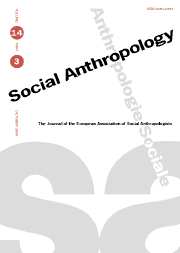Ecology, alterity and resistance in Sardinia
Published online by Cambridge University Press: 26 October 2001
Abstract
The environment has become a powerful locus for the negotiation of cultural identity in Europe. The problem of local resistance to the creation of new conservation areas compels us to question how tropes of cultural alterity shapes environmental programmes in the rural margins of the European Union. In Sardinia, the allochronism deployed in explanations of criminality has also framed discourses promoting a new Italian national park. Converging visions of social and ecological backwardness have naturalised the cultural distance between those who see the Sardinian forest as a local resource protected by indigenous traditions, and those who see it as a European or global resource endangered by local ignorance and violence. Local resistance to the park operates in a range of symbolic and material modes, opening ambiguous political spaces in which to challenge European and environmentalist constructions of history, modernity and backwardness.
- Type
- Research Article
- Information
- Copyright
- © 2001 European Association of Social Anthropologists
Footnotes
- 12
- Cited by


